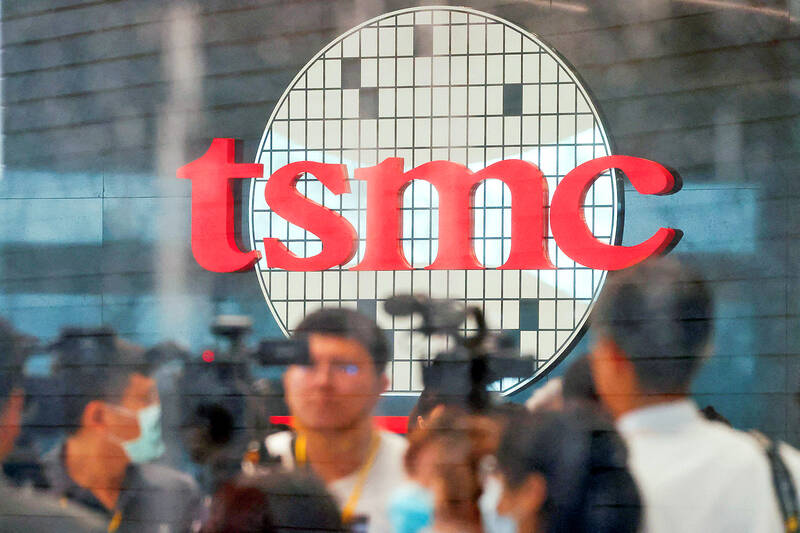Taiwan Semiconductor Manufacturing Co (TSMC, 台積電) yesterday said it has been collaborating with multiple memorychip makers in high-bandwidth memory (HBM) used in artificial intelligence (AI) applications for more than two years, refuting South Korean media report's about an unprecedented partnership with Samsung Electronics Co.
As Samsung is competing with TSMC for a bigger foundry business, any cooperation between the two technology heavyweights would catch the eyes of investors and experts in the semiconductor industry.
“We have been working with memory partners, including Micron, Samsung Memory and SK Hynix, on HBM solutions for more than two years, aiming to advance 3D integrated circuit [IC] design by delivering more memory capacity,” TSMC said in a statement.

Photo: Ann Wang, Reuters
“These cross-industry collaborations aim to provide designers with a full spectrum of proven solutions to tackle the rapidly growing demand in AI,” TSMC added.
TSMC, the world’s largest foundry service provider, has for the first time talked about its collaboration with Samsung Electronics, BusinessKorea reported on Thursday.
“Samsung and TSMC are jointly developing buffer-less HBM,” BusinessKorea quoted TSMC’s Ecosystem and Alliance Management head Dan Kochpatcharin as saying.
The collaboration is to start with HBM4, which is scheduled for mass production in the second half of next year, the magazine said.
The report contradicted a statement released by TSMC in 2022.
The company said that Samsung Memory was among the members of the newly created Open Innovation Platform (OIP) 3DFabric Alliance, together with US memorychip maker Micron Technologies Inc and SK Hynix Inc of South Korea among others. The alliance was initiated by TSMC.
Samsung Electronics memory product planning group vice president Kyungsoo Ha at the time said that by joining TSMC’s OIP 3DFabric Alliance, Samsung Memory would be able to further expand the scope of work and delivery of solutions for future HBM generations to help customers unleash system-level innovations.
TSMC last year said the alliance has made achievements through collaboration with key memory partners, including Micron, Samsung Memory and SK Hynix, to drive rapid growth in HBM3 and HBM3e to advance generative AI systems by delivering more memory capacity.

MULTIFACETED: A task force has analyzed possible scenarios and created responses to assist domestic industries in dealing with US tariffs, the economics minister said The Executive Yuan is tomorrow to announce countermeasures to US President Donald Trump’s planned reciprocal tariffs, although the details of the plan would not be made public until Monday next week, Minister of Economic Affairs J.W. Kuo (郭智輝) said yesterday. The Cabinet established an economic and trade task force in November last year to deal with US trade and tariff related issues, Kuo told reporters outside the legislature in Taipei. The task force has been analyzing and evaluating all kinds of scenarios to identify suitable responses and determine how best to assist domestic industries in managing the effects of Trump’s tariffs, he

In a small town in Paraguay, a showdown is brewing between traditional producers of yerba mate, a bitter herbal tea popular across South America, and miners of a shinier treasure: gold. A rush for the precious metal is pitting mate growers and indigenous groups against the expanding operations of small-scale miners who, until recently, were their neighbors, not nemeses. “They [the miners] have destroyed everything... The canals, springs, swamps,” said Vidal Britez, president of the Yerba Mate Producers’ Association of the town of Paso Yobai, about 210km east of capital Asuncion. “You can see the pollution from the dead fish.

TIGHT-LIPPED: UMC said it had no merger plans at the moment, after Nikkei Asia reported that the firm and GlobalFoundries were considering restarting merger talks United Microelectronics Corp (UMC, 聯電), the world’s No. 4 contract chipmaker, yesterday launched a new US$5 billion 12-inch chip factory in Singapore as part of its latest effort to diversify its manufacturing footprint amid growing geopolitical risks. The new factory, adjacent to UMC’s existing Singapore fab in the Pasir Res Wafer Fab Park, is scheduled to enter volume production next year, utilizing mature 22-nanometer and 28-nanometer process technologies, UMC said in a statement. The company plans to invest US$5 billion during the first phase of the new fab, which would have an installed capacity of 30,000 12-inch wafers per month, it said. The

Taiwan’s official purchasing managers’ index (PMI) last month rose 0.2 percentage points to 54.2, in a second consecutive month of expansion, thanks to front-loading demand intended to avoid potential US tariff hikes, the Chung-Hua Institution for Economic Research (CIER, 中華經濟研究院) said yesterday. While short-term demand appeared robust, uncertainties rose due to US President Donald Trump’s unpredictable trade policy, CIER president Lien Hsien-ming (連賢明) told a news conference in Taipei. Taiwan’s economy this year would be characterized by high-level fluctuations and the volatility would be wilder than most expect, Lien said Demand for electronics, particularly semiconductors, continues to benefit from US technology giants’ effort